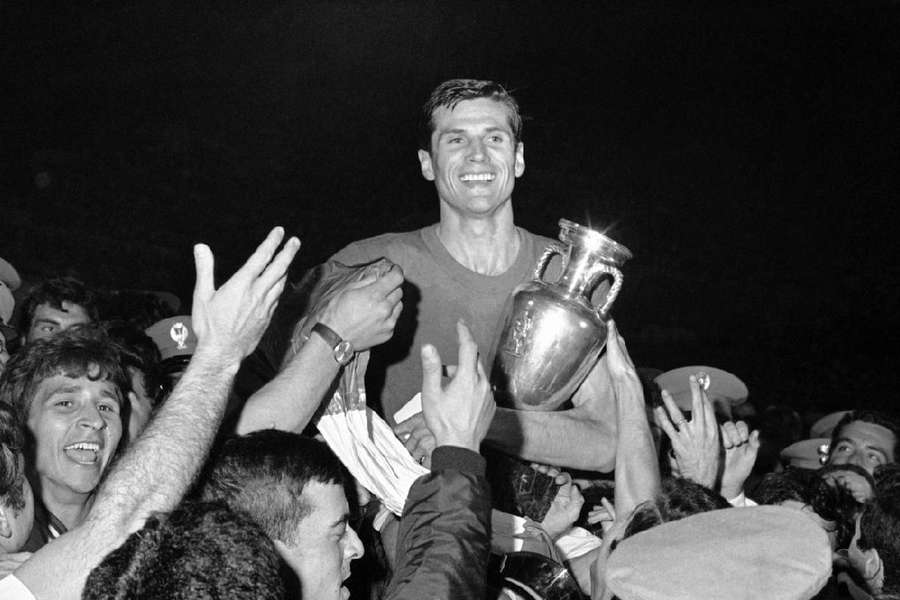After a shameful elimination from the 1966 World Cup in England, where they lost their last group match 1-0 to North Korea, the Italian players had to endure a bombardment of anger on their return home.
Revenge was to come two years later at the renamed European Football Championship.
Not only the name was changed, but also the format: there were eight preliminary groups, with the winners qualifying for the quarter-finals to be played in a round-robin format.
There were two notable moments in the preliminaries: the match between Scotland and England at Hampden Park, the last competitive meeting between the two teams before EURO 96, attracted what remains a EURO attendance record of 130,711.
And the first group match in EURO history, played on September 7th 1966 between the Netherlands and Hungary, saw the debut of Johan Cruyff, who would later become one of football's icons.
England, Italy, the USSR and Yugoslavia - were the four teams that advanced from the quarter-finals to the mini-final tournament hosted on Italian soil.
Catenaccio, catenaccio, catenaccio
After the disgrace of the World Cup, the Italian Football Federation put the national team in the hands of a duo made up of Inter Milan's legendary coach Helenio Herrera and Ferruccio Valcareggi, Edmondo Fabbri's assistant since 1966, who soon became solely responsible for the fate of the Azzurri.
Valcareggi was not a coach known for winning matches, but rather for not losing them. He adopted Herrera's preferred closed style at Inter, the famous Catenaccio that has since entered the footballing vocabulary.
The approach of not conceding a goal and then seeing if they could score one led to an extremely close duel in the semi-final against the USSR in Naples. After 120 minutes the score was 0-0, and because the penalty shootout would not be introduced for another two years, the team that qualified for the final would be decided in a way that remains unique in EURO history: a coin toss.
The moment was not in the stadium, but in the referees' dressing room, so for a few minutes the 68,000 spectators in the then San Paolo (now Diego Armando Maradona) Stadium waited with bated breath, only to erupt in cheers when captain Giacinto Facchetti emerged from the tunnel towards the dressing rooms and raised his fist in the air.
"I walked with the Russian captain. We went down to the changing rooms together, accompanied by two administrators from the two teams. The referee pulled out an old coin and I said tails. It was the right decision and Italy qualified for the final.
"We rushed upstairs as the stadium was still full and about 70,000 fans were waiting to hear the result. They saw me celebrating and realised they could celebrate an Italian victory," said Giacinto Facchetti after that semi-final.
The final is coming together
An equally tangled affair was recorded a few days later (June 8th 1968) at the Stadio Olimpico in Rome.
Dragan Dzajic opened the scoring for Yugoslavia in the 39th minute (the Yugoslavs had beaten England 1-0 in the semi-finals), but Italy equalised 10 minutes before time thanks to an Angelo Domneghini free-kick that pierced the opponents' wall.
The draw at the end meant the final needed a replay, the only time in EURO or World Cup history that this has happened.
Valcareggi changed half the team from the first match. Sandro Mazzola, absent two days earlier due to injury, played a decisive role, while the legendary Gigi Riva, still the Azzurri's all-time leading scorer, who had been injured for a long period, started and scored the opening goal.
Italy sealed the win with a gem of a goal from Pietro Anastasi, who easily lifted a through ball from the edge of the box before volleying home unstoppably.
The Squadra Azzurra thus won their first European title, one that in many ways is similar to the one they won decades later at Euro 2020, but we'll talk about that triumph in a future episode.


